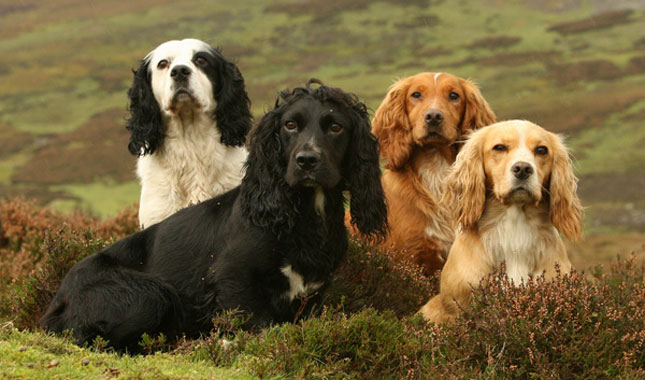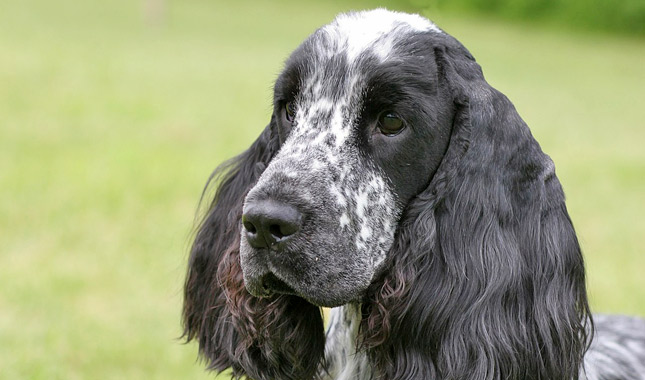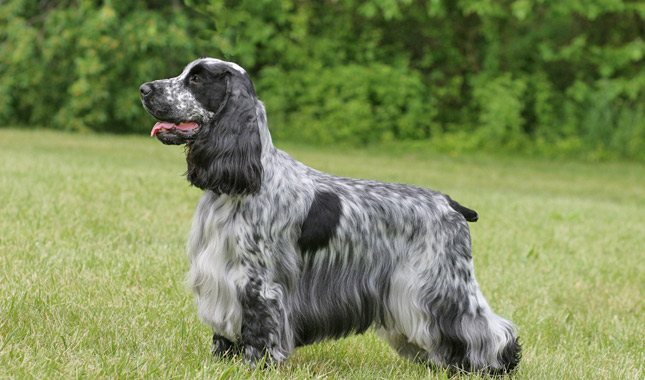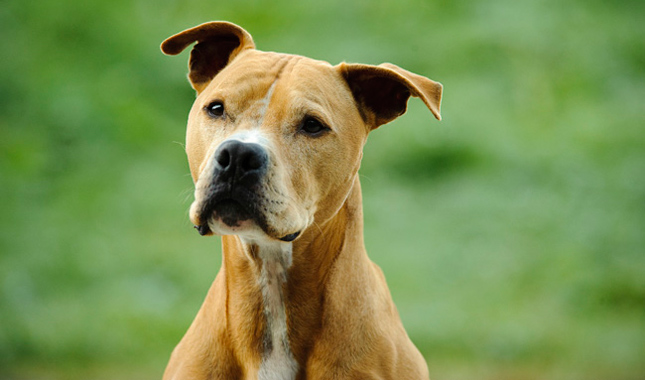English Cocker Spaniel
Published on July 07, 2011
Skip To
Breed Details
- Height: 15 to 17 inches at the shoulder
- Weight: 26 to 34 pounds
Breed Characteristics
Adaptability
Trainability
Grooming
Apartament Friendly
Child Friendly
Shedding Level
Dog Friendly
Exercise Needs
Territorial
Barking Tendencies
Health Issues
Social Needs
Energy Level
Affectionate
Watchdog Instincts
Cat Friendly
Intelligence
Stranger Friendly
Larger than the American Cocker and with less coat, the English Cocker is devoted, affectionate, and funny. He learns quickly and is an ace at sports such as agility.
Most people don’t know that in addition to the Cocker Spaniel there was a separate breed known as the English Cocker Spaniel. What’s the difference? As you can probably guess, the two breeds used to be one, but they diverged so much in appearance that in 1946 the English Cocker was given status as a distinct breed.
The English Cocker has since diverged further in appearance, leading to a split between dogs bred for the field and those bred for the show ring. Field-bred English Cockers have a shorter coat, a deeper chest and stand lower to the ground than conformation English Cockers. Both types have the potential to be fine companion dogs.
In the field, his job is to flush birds from heavy cover and then retrieve them. Even if you don’t hunt, he’ll still take every opportunity to flush any feathered game and do his best to go after it. Unless you’re in a traffic-free area, keep him on leash or you’ll lose him to the chase.
You may see some English Cockers described as “field bred.” That means they come from hunting lines and may be somewhat larger and more active, with a little less coat than English Cockers bred to be show dogs. There are some other minor differences in conformation (the way the dog looks) such as a shorter muzzle, ears that are set a little higher on the head, and the amount of tail that is docked.
A people-loving dog like the English Cocker needs to live in the house.
In the United States and Britain, Cockers developed different looks, so much so that they began to be considered separate breeds. The English Cocker Spaniel Club of America was formed in 1935 for people who appreciated the different look and abilities of the English Cocker. The American Kennel Club recognized it as an individual breed in 1946. The American Cocker became more popular, but fanciers of the English Cocker consider their dogs a well-kept secret. Today, the English Cocker ranks 66th among the breeds registered by the AKC.
Plan to give an English Cocker daily exercise in the form of a long walk or a half-hour run. He’s also a super competitor in dog sports such as agility, obedience, and rally, and his excellent nose makes him a natural at tracking. English Cockers often love to swim, so if you spend a lot of time at the beach or on a boat, you may quickly become your English Cocker’s best friend.
Train the English Cocker with firmness and consistency to overcome his occasional tendency act like an airhead. For best results, use positive reinforcement techniques such as praise, play, and food rewards. English Cockers should never be shy or aggressive, but there are some problems with temperament in the breed. Prefer a breeder who temperament tests breeding dogs and puppies and has dogs with the “TT” title from the American Temperament Test Society.
Start training your puppy the day you bring him home. Even at eight weeks old, he is capable of soaking up everything you can teach him. Don’t wait until he is 6 months old to begin training or you will have a more headstrong dog to deal with. If possible, get him into puppy kindergarten class by the time he is 10 to 12 weeks old, and socialize, socialize, socialize. However, be aware that many puppy training classes require certain vaccines (like kennel cough) to be up to date, and many veterinarians recommend limited exposure to other dogs and public places until puppy vaccines (including rabies, distemper and parvovirus) have been completed. In lieu of formal training, you can begin training your puppy at home and socializing him among family and friends until puppy vaccines are completed.
Talk to the breeder, describe exactly what you’re looking for in a dog, and ask for assistance in selecting a puppy. Breeders see the puppies daily and can make uncannily accurate recommendations once they know about your lifestyle and personality. Whatever you want from an English Cocker Spaniel, look for one whose parents have nice personalities and who has been well socialized from early puppyhood.
English Cockers have some health conditions that can be a concern. They include progressive retinal atrophy, patellar luxation, cataracts, immune mediated hemolytic anemia, ear infections, juvenile-onset renal failure, hypothyroidism, and, in parti-colors, hearing loss.
Ask the breeder to show evidence that both of a puppy’s parents have hip, knee and thyroid clearances from the Orthopedic Foundation for Animals, OFA BAER (Brainstem Auditory Evoked Response) test results for hearing, and eye clearances from the Canine Eye Registry Foundation.
Remember that after you’ve taken a new puppy into your home, you have the power to protect him from one of the most common health problems: obesity. Keeping an English Cocker at an appropriate weight is one of the easiest ways to extend his life. Make the most of your preventive abilities to help ensure a healthier dog for life.
The rest is basic care. Trim the nails as needed, usually every couple of weeks. Brush the teeth frequently for good overall health and fresh breath. Most important, keep the ears clean and dry to prevent bacterial or yeast infections from driving your dog into a state of itchy madness.
Reputable breeders will welcome your questions about temperament, health clearances, and what the dogs are like to live with. They will come right back at you with questions of their own about what you’re looking for in a dog and what kind of life you plan to provide. A good breeder can tell you about the history of the breed, explain why one puppy is considered pet quality while another is not, and discuss what health problems affect the breed and the steps were taken to avoid them. A breeder should want to be a resource for you throughout your dog’s life.
Look for more information about the English Cocker Spaniel and start your search for a good breeder at the website of the English Cocker Spaniel Club of America. Choose a breeder who has agreed to abide by the ECSCA’s code of ethics, which prohibits the sale of puppies to or through pet stores and calls for the breeder to obtain recommended health clearances on dogs before breeding them.
Avoid breeders who only seem interested in how quickly they can unload a puppy on you and whether your credit card will clear. Breeders who offer puppies at one price “with papers” and at a lower price “without papers” are unethical. You should also bear in mind that buying a puppy from websites that offer to ship your dog to you immediately can be a risky venture, as it leaves you no recourse if what you get isn’t exactly what you expected. Put at least as much effort into researching your puppy as you would into choosing a new car or expensive appliance. It will save you money in the long run.
Lots of reputable breeders have websites, so how can you tell who’s good and who’s not? Red flags include over availability, multiple litters on the premises, a choice of any puppy, and the ability to pay online with a credit card. Those things are convenient, but they are almost never associated with reputable breeders.
Whether you’re planning to get your new best friend from a breeder, a pet store, or another source, don’t forget that old adage “let the buyer beware”. Disreputable breeders and facilities that deal with puppy mills can be hard to distinguish from reliable operations. There’s no 100% guaranteed way to make sure you’ll never purchase a sick puppy, but researching the breed (so you know what to expect), checking out the facility (to identify unhealthy conditions or sick animals), and asking the right questions can reduce the chances of heading into a disastrous situation. And don’t forget to ask your veterinarian, who can often refer you to a reputable breeder, breed rescue organization, or other reliable source for healthy puppies.
The cost of an English Cocker Spaniel puppy varies depending on the breeder’s locale, whether the pup is male or female, what titles his parents have, and whether he is best suited for the show ring or a pet home. The puppy you buy should have been raised in a clean home environment, from parents with health clearances and conformation (show) and, ideally, working titles to prove that they are good specimens of the breed. Puppies should be temperament tested, vetted, dewormed, and socialized to give them a healthy, confident start in life.
Before you decide to buy a puppy, consider whether an adult English Cocker Spaniel might better suit your needs and lifestyle. Puppies are loads of fun, but they require a lot of time and effort before they grow up. An adult may already have some training and will probably be less active, destructive, and demanding than a puppy. With an adult, you know more about what you’re getting in terms of personality and health and you can find adults through breeders or shelters. If you are interested in acquiring an older dog through breeders, ask them about purchasing a retired show dog or if they know of an adult dog who needs a new home. If you want to adopt a dog, read the advice below on how to do that.
1. Use the Web
Sites like Petfinder.com can have you searching for an English Cocker in your area in no time flat. The site allows you to be very specific in your requests (housetraining status, for example) or very general (all the English Cockers available on Petfinder across the country). AnimalShelter can help you find animal rescue groups in your area. Also some local newspapers have “pets looking for homes” sections you can review.
Social media is another great way to find a dog. Post on your Facebook page that you are looking for a specific breed so that your entire community can be your eyes and ears.
2. Reach Out to Local Experts
Start talking with all the pet pros in your area about your desire for an English Cocker. That includes vets, dog walkers, and groomers. When someone has to make the tough decision to give up a dog, that person will often ask her own trusted network for recommendations.
3. Talk to Breed Rescue
Most people who love English Cockers love all English Cockers. That’s why breed clubs have rescue organizations devoted to taking care of homeless dogs. The English Cocker Spaniel Club of America’s rescue network can help you find a dog that may be the perfect companion for your family. You can also search online for other English Cocker rescues in your area.
The great thing about breed rescue groups is that they tend to be very upfront about any health conditions the dogs may have and are a valuable resource for advice. They also often offer fostering opportunities so, with training, you could bring an English Cocker home with you to see what the experience is like.
4. Key Questions to Ask
You now know the things to discuss with a breeder, but there are also questions you should discuss with shelter or rescue group staff or volunteers before you bring home a dog. These include:
What is his energy level?
How is he around other animals?
How does he respond to shelter workers, visitors and children?
What is his personality like?
What is his age?
Is he housetrained?
Has he ever bitten or hurt anyone that they know of?
Are there any known health issues?
Wherever you acquire your English Cocker, make sure you have a good contract with the seller, shelter or rescue group that spells out responsibilities on both sides. Petfinder offers an Adopters Bill of Rights that helps you understand what you can consider normal and appropriate when you get a dog from a shelter. In states with “puppy lemon laws,” be sure you and the person you get the dog from both understand your rights and recourses.
Puppy or adult, take your English Cocker to your veterinarian soon after adoption. Your veterinarian will be able to spot problems, and will work with you to set up a preventive regimen that will help you avoid many health issues.
The English Cocker has since diverged further in appearance, leading to a split between dogs bred for the field and those bred for the show ring. Field-bred English Cockers have a shorter coat, a deeper chest and stand lower to the ground than conformation English Cockers. Both types have the potential to be fine companion dogs.
In the field, his job is to flush birds from heavy cover and then retrieve them. Even if you don’t hunt, he’ll still take every opportunity to flush any feathered game and do his best to go after it. Unless you’re in a traffic-free area, keep him on leash or you’ll lose him to the chase.
You may see some English Cockers described as “field bred.” That means they come from hunting lines and may be somewhat larger and more active, with a little less coat than English Cockers bred to be show dogs. There are some other minor differences in conformation (the way the dog looks) such as a shorter muzzle, ears that are set a little higher on the head, and the amount of tail that is docked.
A people-loving dog like the English Cocker needs to live in the house.
Other Quick Facts
- What’s in a name? In Britain, what Americans call the “English” Cocker is the Cocker, and the American dog is the American Cocker.
- The term spaniel used to be applied to any dog that hunted and flushed game birds. They were usually differentiated by size or the way they worked.
The History of the English Cocker Spaniel
The term spaniel used to be applied to any dog that hunted and flushed game birds. They were usually differentiated by size or the way they worked. For instance, there were land spaniels and water spaniels. Dogs that hunted woodcock became known as Cockers, while larger spaniels that “sprang” game from cover by flushing it became known as Springers. At one time, different types could be born in the same litter, but eventually they were separated into breeds: Cocker Spaniels and Springer Spaniels.In the United States and Britain, Cockers developed different looks, so much so that they began to be considered separate breeds. The English Cocker Spaniel Club of America was formed in 1935 for people who appreciated the different look and abilities of the English Cocker. The American Kennel Club recognized it as an individual breed in 1946. The American Cocker became more popular, but fanciers of the English Cocker consider their dogs a well-kept secret. Today, the English Cocker ranks 66th among the breeds registered by the AKC.
English Cocker Spaniel Temperament and Personality
The English Cocker possesses the traits common to all spaniels: He’s affectionate, cheerful and devoted to his people. Funny and inquisitive, he will make you laugh, and he can be a good choice for families with children. At maturity (when he will weigh 25 to 35 pounds), he’s not so big that he can hurt youngsters and not so small that he runs much risk of being hurt by them. He also gets along well with other pets such as cats if he’s raised with them. He may be reserved with strangers and his alert nature makes him a good watchdog.Plan to give an English Cocker daily exercise in the form of a long walk or a half-hour run. He’s also a super competitor in dog sports such as agility, obedience, and rally, and his excellent nose makes him a natural at tracking. English Cockers often love to swim, so if you spend a lot of time at the beach or on a boat, you may quickly become your English Cocker’s best friend.
Train the English Cocker with firmness and consistency to overcome his occasional tendency act like an airhead. For best results, use positive reinforcement techniques such as praise, play, and food rewards. English Cockers should never be shy or aggressive, but there are some problems with temperament in the breed. Prefer a breeder who temperament tests breeding dogs and puppies and has dogs with the “TT” title from the American Temperament Test Society.
Start training your puppy the day you bring him home. Even at eight weeks old, he is capable of soaking up everything you can teach him. Don’t wait until he is 6 months old to begin training or you will have a more headstrong dog to deal with. If possible, get him into puppy kindergarten class by the time he is 10 to 12 weeks old, and socialize, socialize, socialize. However, be aware that many puppy training classes require certain vaccines (like kennel cough) to be up to date, and many veterinarians recommend limited exposure to other dogs and public places until puppy vaccines (including rabies, distemper and parvovirus) have been completed. In lieu of formal training, you can begin training your puppy at home and socializing him among family and friends until puppy vaccines are completed.
Talk to the breeder, describe exactly what you’re looking for in a dog, and ask for assistance in selecting a puppy. Breeders see the puppies daily and can make uncannily accurate recommendations once they know about your lifestyle and personality. Whatever you want from an English Cocker Spaniel, look for one whose parents have nice personalities and who has been well socialized from early puppyhood.
What You Need to Know About English Cocker Spaniel Health
All purebred dogs have the potential to develop genetic health problems, just as all people have the potential to inherit disease. Run from any breeder who does not offer a health guarantee on puppies, who tells you that the breed has no known problems, or who keeps puppies isolated from the main part of the household for health reasons. A reputable breeder will be honest and open about health problems in the breed and the incidence with which they occur.English Cockers have some health conditions that can be a concern. They include progressive retinal atrophy, patellar luxation, cataracts, immune mediated hemolytic anemia, ear infections, juvenile-onset renal failure, hypothyroidism, and, in parti-colors, hearing loss.
Ask the breeder to show evidence that both of a puppy’s parents have hip, knee and thyroid clearances from the Orthopedic Foundation for Animals, OFA BAER (Brainstem Auditory Evoked Response) test results for hearing, and eye clearances from the Canine Eye Registry Foundation.
Remember that after you’ve taken a new puppy into your home, you have the power to protect him from one of the most common health problems: obesity. Keeping an English Cocker at an appropriate weight is one of the easiest ways to extend his life. Make the most of your preventive abilities to help ensure a healthier dog for life.
The Basics of English Cocker Spaniel Grooming
Brush the English Cocker’s medium-length coat two or three times a week to prevent or remove mats and tangles. You may also need to trim it for neatness every couple of months. A bath every six weeks or so doesn’t go amiss. The coat sheds moderately, but regular brushing will help keep loose hair from floating onto your floor, furniture, and clothing.The rest is basic care. Trim the nails as needed, usually every couple of weeks. Brush the teeth frequently for good overall health and fresh breath. Most important, keep the ears clean and dry to prevent bacterial or yeast infections from driving your dog into a state of itchy madness.
Finding an English Cocker Spaniel
Whether you want to go with a breeder or get your dog from a shelter or rescue, here are some things to keep in mind.Choosing an English Cocker Spaniel Breeder
Finding a quality breeder is the key to finding the right puppy. A good breeder will match you with the right puppy, and will have done all the health certifications necessary to screen out as many problems as possible. He or she is more interested in placing pups in the right homes than making big bucks. Be wary of breeders who only tell you the good things about the breed or who promote the dogs as being “good with kids” without any context as to what that means or how it comes about.Reputable breeders will welcome your questions about temperament, health clearances, and what the dogs are like to live with. They will come right back at you with questions of their own about what you’re looking for in a dog and what kind of life you plan to provide. A good breeder can tell you about the history of the breed, explain why one puppy is considered pet quality while another is not, and discuss what health problems affect the breed and the steps were taken to avoid them. A breeder should want to be a resource for you throughout your dog’s life.
Look for more information about the English Cocker Spaniel and start your search for a good breeder at the website of the English Cocker Spaniel Club of America. Choose a breeder who has agreed to abide by the ECSCA’s code of ethics, which prohibits the sale of puppies to or through pet stores and calls for the breeder to obtain recommended health clearances on dogs before breeding them.
Avoid breeders who only seem interested in how quickly they can unload a puppy on you and whether your credit card will clear. Breeders who offer puppies at one price “with papers” and at a lower price “without papers” are unethical. You should also bear in mind that buying a puppy from websites that offer to ship your dog to you immediately can be a risky venture, as it leaves you no recourse if what you get isn’t exactly what you expected. Put at least as much effort into researching your puppy as you would into choosing a new car or expensive appliance. It will save you money in the long run.
Lots of reputable breeders have websites, so how can you tell who’s good and who’s not? Red flags include over availability, multiple litters on the premises, a choice of any puppy, and the ability to pay online with a credit card. Those things are convenient, but they are almost never associated with reputable breeders.
Whether you’re planning to get your new best friend from a breeder, a pet store, or another source, don’t forget that old adage “let the buyer beware”. Disreputable breeders and facilities that deal with puppy mills can be hard to distinguish from reliable operations. There’s no 100% guaranteed way to make sure you’ll never purchase a sick puppy, but researching the breed (so you know what to expect), checking out the facility (to identify unhealthy conditions or sick animals), and asking the right questions can reduce the chances of heading into a disastrous situation. And don’t forget to ask your veterinarian, who can often refer you to a reputable breeder, breed rescue organization, or other reliable source for healthy puppies.
The cost of an English Cocker Spaniel puppy varies depending on the breeder’s locale, whether the pup is male or female, what titles his parents have, and whether he is best suited for the show ring or a pet home. The puppy you buy should have been raised in a clean home environment, from parents with health clearances and conformation (show) and, ideally, working titles to prove that they are good specimens of the breed. Puppies should be temperament tested, vetted, dewormed, and socialized to give them a healthy, confident start in life.
Before you decide to buy a puppy, consider whether an adult English Cocker Spaniel might better suit your needs and lifestyle. Puppies are loads of fun, but they require a lot of time and effort before they grow up. An adult may already have some training and will probably be less active, destructive, and demanding than a puppy. With an adult, you know more about what you’re getting in terms of personality and health and you can find adults through breeders or shelters. If you are interested in acquiring an older dog through breeders, ask them about purchasing a retired show dog or if they know of an adult dog who needs a new home. If you want to adopt a dog, read the advice below on how to do that.
Adopting a Dog from an English Cocker Spaniel Rescue or a Shelter
There are many great options available if you want to adopt a dog from an animal shelter or breed rescue organization. Here is how to get started.1. Use the Web
Sites like Petfinder.com can have you searching for an English Cocker in your area in no time flat. The site allows you to be very specific in your requests (housetraining status, for example) or very general (all the English Cockers available on Petfinder across the country). AnimalShelter can help you find animal rescue groups in your area. Also some local newspapers have “pets looking for homes” sections you can review.
Social media is another great way to find a dog. Post on your Facebook page that you are looking for a specific breed so that your entire community can be your eyes and ears.
2. Reach Out to Local Experts
Start talking with all the pet pros in your area about your desire for an English Cocker. That includes vets, dog walkers, and groomers. When someone has to make the tough decision to give up a dog, that person will often ask her own trusted network for recommendations.
3. Talk to Breed Rescue
Most people who love English Cockers love all English Cockers. That’s why breed clubs have rescue organizations devoted to taking care of homeless dogs. The English Cocker Spaniel Club of America’s rescue network can help you find a dog that may be the perfect companion for your family. You can also search online for other English Cocker rescues in your area.
The great thing about breed rescue groups is that they tend to be very upfront about any health conditions the dogs may have and are a valuable resource for advice. They also often offer fostering opportunities so, with training, you could bring an English Cocker home with you to see what the experience is like.
4. Key Questions to Ask
You now know the things to discuss with a breeder, but there are also questions you should discuss with shelter or rescue group staff or volunteers before you bring home a dog. These include:
What is his energy level?
How is he around other animals?
How does he respond to shelter workers, visitors and children?
What is his personality like?
What is his age?
Is he housetrained?
Has he ever bitten or hurt anyone that they know of?
Are there any known health issues?
Wherever you acquire your English Cocker, make sure you have a good contract with the seller, shelter or rescue group that spells out responsibilities on both sides. Petfinder offers an Adopters Bill of Rights that helps you understand what you can consider normal and appropriate when you get a dog from a shelter. In states with “puppy lemon laws,” be sure you and the person you get the dog from both understand your rights and recourses.
Puppy or adult, take your English Cocker to your veterinarian soon after adoption. Your veterinarian will be able to spot problems, and will work with you to set up a preventive regimen that will help you avoid many health issues.










